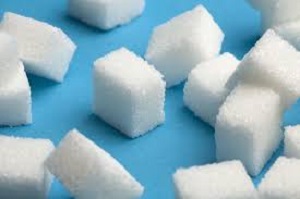The World Health Organization (WHO) has issued new guidelines suggesting that cutting the amount of sugar we eat from the current recommended limit of 10% of daily energy intake to 5% would be beneficial.
That’s about 25g (around six teaspoons) for an adult of normal weight every day.
To put this in context a typical can of fizzy drink contains about nine teaspoons of sugar.
The limits would apply to all sugars added to food, as well as sugar naturally present in honey, syrups, fruit juices and fruit concentrates.
Sugar has become a readily accepted and at times almost unnoticed part of many everyday diets.
The type we usually mean – the white, powdery table-top version that we add to tea and sprinkled on top of cakes – is known as sucrose and is found naturally in plants such as sugar cane.
Sugars occur in other plants and foodstuffs too – for example lactose in milk and fructose in fruit.
The body can call on these compounds as quick-release fuel. If the energy isn’t needed, it gets stored for later and is sometimes converted into fat.
For the last century, sugar has been added to an increasing number of foods.
And experts are concerned that this added sugar, which may be present in food we wouldn’t expect to find it in, is harming our health.
Some scientists say for the majority of people, with diets that are already rich in calories, there is no need for any of the extra calories added sugar carries.
It has no nutritional value for people who are not starving or unable to absorb food and can contribute to tooth decay.
And most of the food with added sugar in it has lots of fat in it too.
- Food and drinks that have a lot of added sugar contain calories, but often have few other nutrients
- Sugary foods and drinks can also cause tooth decay, especially eaten between meals
- Sugar found naturally in whole fruit is less likely to cause tooth decay than juices or blends because the sugar is contained within the body of the fruit
So eating sugar-rich food can make a hefty contribution to the calories we consume.
The more calories we take in, the more likely we are to be obese.
And obesity is linked to heart disease, type 2 diabetes, cancers and other causes of death.
But it is not just the calorific content of sugar that worries experts.
A growing number of scientists believe the calories from sugar are not all treated by the body in the same way.
One of the most consistent links appears to be between obesity and a high intake of sugar-sweetened beverages.
Sugar found in sugary drinks may be easier to digest and may not leave us feeling full – leaving us room to eat more.
Some research suggests fructose may promote deposits of fat in the liver and other parts of the body.
And some scientists are worried that the chemistry behind the quick spikes in blood sugar we get from things such as fizzy drinks and cakes might in itself be linked to diseases such as diabetes.
There are modifications you can make, for example eating more whole fruit instead of drinking lots of fruit juice, or cutting down on sugar added to cups of tea.
It may also be worth checking the ingredient lists for foods that don’t obviously have sugar in – for example low-fat foods.
But it is not always easy to spot how much sugar is in manufactured food. Sometimes it is hard to tell how much sugar is added to a product and how much sugar is intrinsic to its natural ingredients.
Source: BBC
N.H.Khider

